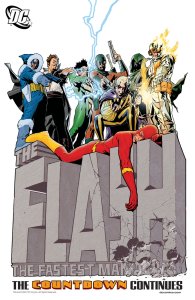Wow… a new issue of Rising Stars! To be honest, it was a bit of a let-down. Usually JMS is better at showing, rather than telling. He’s infamous for laboriously laying groundwork in the B-plots and character moments of what seem like “ordinary” stand-alone stories, then kicking the arc into high gear and making use of it all. He did it with Babylon 5 and Crusade, with the first arc of Rising Stars, seems to be taking the same approach in Supreme Power, and from what I’ve heard (though I’ve seen very little of it) he did the same with Jeremiah as well. If you’ve seen B5 once the story got going, go back and look at some of the first season episodes, and you’ll be surprised how early some elements are established.
This issue, however, though it had some nice moments, was basically a plot summary. “Poet tells the story of…” It seemed an odd narrative choice, particularly for an issue so near the end of the story (#22 of 24) and for the first issue to hit the shelves in nearly two years. Maybe it’ll read better in context.
Anyway, that’s not what I really wanted to talk about. What’s interesting is that in this issue, one of the Specials runs for President. It reminded me of something about the way comic books tell campaign stories. When a fictional character is in the race (or the office), he (it usually is a he) is almost always running under one of three circumstances:
- As an independent.
- On a fictional third-party ticket.
- On an unidentified party’s ticket.
As we all know, third party candidates are rarely high-profile, and they rarely get significant numbers of votes, and I don’t think one has ever won the office*. Yet in comics, it happens all the time. Of course, heat vision, teleporters, and people who wear purple tights to fight crime are also commonplace.
When you think about it, the reason is obvious: the publishers do not want to be accused of political bias, nor do they want to alienate half their readers (or half their readers’ parents). So you get Ravenshadow running as an independent in Rising Stars, or Lex Luthor’s “Tomorrow Party” [archive.org] in 2000, or the disguised Top’s Vice-Presidential bid as an unidentified third-party candidate in 1996.
There is another approach. One of 1991’s Armageddon 2001 stories featured Superman running for President. It’s told in the context of the two-party system: he goes through the primaries, runs against one opponent, etc. But they never actually say which party he’s running with, so you’re free to make assumptions based on your own political leanings.
On the other hand, when all the story needs is the participation of the current President, most comics will use the real President. This, of course, makes for some of the more dramatic examples of the ever-shifting timeline of shared-universe comics, like the perrenially-thirtyish Superman shaking hands with JFK. Perhaps this disconnect is another reason to stick with fictional Presidents.
* We have elected presidents from other parties, but not since 1850. Even then, if I remember correctly — and feel free to correct me if I don’t — there were generally two main parties… it was just a matter of which two parties were at the top. Here’s a table of past US Presidents.



Beautiful words my man.
STICK IT TO THE MAN
I came upon this whilst doing some research and I just wanted to add another one:
Howard the Duck’s All-Night Party in 1976.
They almost won the election, but who wouldn’t vote for the All-Night Party.